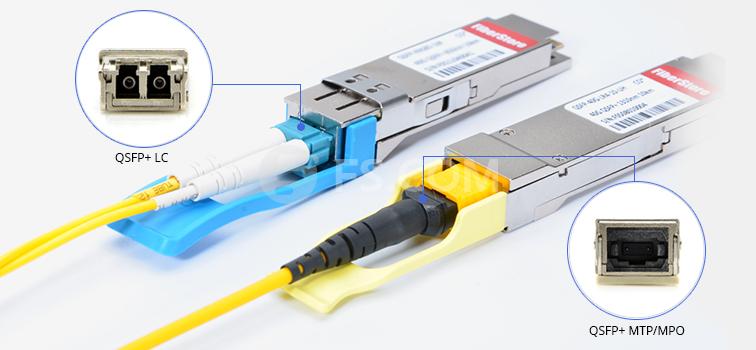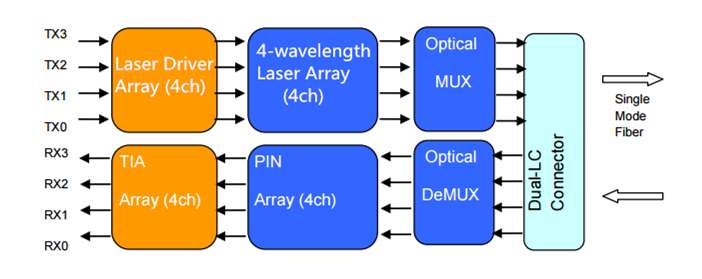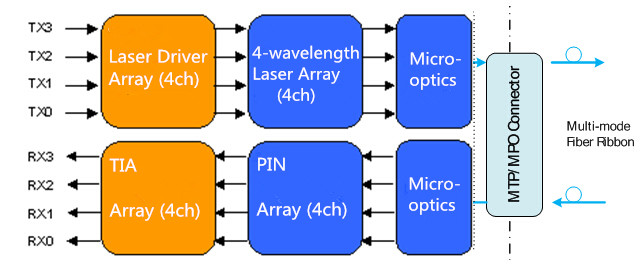With
40 Gigabit Ethernet commonly deployed in most data centers, it is very
essential for the data center managers to employ the suitable 40G
devices like 40G QSFP+ transceivers. Nowadays, various 40G transceivers
are available on the market, but mainly there are two interfaces adopted
by 40G QSFP+ transceivers—MTP/MPO and LC. What’s the difference between
these two interface types? This article will have an analysis of the
40G QSFP+ transceivers with MTP/MPO interface and 40G QSFP+ transceivers
with LC interface.

Transmission Distance and Cable Type
Generally,
the 40G QSFP+ transceivers with LC interface are used for long distance
transmission over single-mode fiber (SMF), and QSFP+ transceivers with
MTP/MPO interface are utilized for short distance transmission over
multimode fiber (MMF). However, for some 40G transceivers with MTP/MPO
interface, such as 40GBASE-PLRL4, and 40GBASE-PLR4, they can support
long distance transmission over SMF.
Working Principle
40G
QSFP+ transceivers with LC interface—In the transmit side, 4-channel
10G serial data streams are passed to laser drivers. The laser drivers
control directly modulated lasers (DML) with wavelengths. Then the
output of the four DMLs are optically multiplexed to a SMF through an
industry-standard LC connector, combining as 40G optical signal. In the
receive side, the 40G optical signals are demultiplexed into 4
individual 10G channels with different wavelength. Each wavelength light
is collected by a discrete photo diode, and then outputted as electric
data after amplified by a TIA. In this process, a 4-wavelength CWDM
multiplexer and demultiplexer is used over a pair of single-mode fibers.

40G QSFP+ transceivers with MTP/MPO interface—In the transmit side, the transmitter converts parallel electrical input signals into parallel optical signals through the use of a laser array. Then the parallel optical signals are transmitted parallelly through the multimode fiber ribbon. In the receive side, the receiver converts parallel optical input signals via a photo detector array into parallel electrical output signals.

Note: there are some 40G transceivers with MTP/MPO interface working over SMF as mentioned above. For this kind of PSM (a parallel single-mode optical transceiver with an MTP/MPO fiber ribbon connector) QSFP+, it offers 4 independent transmit and receive channels, each capable of 10G operation for an aggregate data rate of 40G over SMF. That is to say, 8 single-mode fibers are used to achieve parallel transmission.
4x10G Connectivity
For
the 40G QSFP+ transceivers with LC interface, they cannot be split into
4x10G as they use 4 wavelengths on a pair of single-mode fibers and do
not lend themselves to “splitting” into 4 pairs without substantial
complexity to split out the wavelengths. For the 40G QSFP+ transceivers
with MTP/MPO interface, they can be used in 4x10G connectivity via an
external 12-fiber parallel to 2-fiber duplex breakout cable, which
connects the 40G module to four 10G optical interfaces.
FS.COM 40G Transceivers Solution
As
a professional manufacturer and supplier in optical communication
industry, FS.COM provides a series of 40G transceivers to meet various
network demands. The following table lists the generic ones. Besides the
generic ones, the 40G transceivers compatible with other brands, such
as Cisco, Juniper are also available. Most of them are in stock now and
can be shipped the same day after order.
| Model | Interface Type | Cable Type | Max Cable Distance | |
| 40GBASE-CSR4 | MTP/MPO | MMF | 400 m over OM4 MMF | |
| 40GBASE-SR4 | MTP/MPO | MMF | 150 m over OM4 MMF | |
| 40GBASE-PLRL4 | MTP/MPO | SMF | 1.4 km | |
| 40GBASE-PLR4 | MTP/MPO | SMF | 10 km | |
| 40GBASE-LR4 | LC duplex | SMF | 10 km | |
| 40GBASE-LR4L | LC duplex | SMF | 2 km | |
| 40GBASE-ER4 | LC duplex | SMF | 40 km | |
| 40GBASE-LX4 | LC duplex | MMF/SMF | OM3/OM4 MMF: 150 m, SMF: 2 km | |
| 40GBASE-SR BiDi | LC duplex | MMF | 150m@OM4/100m@OM3/30m@OM2 | |
| 40GBASE-LR4 CFP | SC duplex | SMF | 10 km | |
Originally published: www.fiberopticshare.com/40g-transceivers-mtpmpo-interface-vs-40g-transceivers-lc-interface.html
没有评论:
发表评论